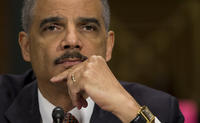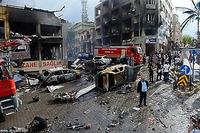-
A “cauldron of events” has brought the nuclear industry to a halt
Until two years ago, people talked of a nuclear energy renaissance. Now the talk is about nuclear malaise. The Fukushima scare, the emergence of alternative energy sources as a result of fracking, and the lack of action on climate change – which means that limits on fossil fuels are not coming any time soon – have, in the words of one experts, brought the nuclear industry to a halt.
-
-
Oakland wants to write its own gun control laws
The leaders of Oakland, California, say that state gun laws are not suitable for their crime-infested city. They want to write their own gun law, saying it would not ban guns, but would allow the city to have tighter controls on who owns and who is selling them and buying them.
-
-
U.S. secretly obtains AP phone records to identify source of story

In what the AP calls a “massive and unprecedented intrusion” into the news organization’s news work, the U.S. Justice Department secretly gathered two-months-worth of telephone records of the agency’s reporters and editors. The AP says the records listed incoming and outgoing calls to the offices and homes of reporters and editors. The Justice Department began collecting the phone records in order to identify the source or sources of a 7 May 2012 AP story which detailed a secret CIA operation in Yemen to intercept an al Qaeda-sponsored attempt to load an IED onto a U.S.-bound airplane.
-
-
The administration's struggle to define Benghazi attack as “terrorism”
Administration critics on the Hill now focus more of their attention on the changing explanations administration officials have offered in public as to the nature of the attack and the identity of the perpetrators. Yesterday, President Obama said the he used the term “terrorism” early on, and that he dispatched a senior official to brief lawmakers in the issue. He is right – up to a point: On 12 September Obama did describe the attack as an “act of terror,” and on 19 September counterterrorism director Matt Olsen used the term in response to a senator’s question, but otherwise, until 20 September, all high-level administration officials, including Obama, declined to attribute the attack to terrorists.
-
-
Saudi man arrested at Detroit airport with two pressure cookers in luggage

Hussain Al Khawahir, a Saudi citizen, was arrested Saturday at Detroit Metropolitan Airport after CBP agents found two pressure cookers in his luggage, and a page missing from his Saudi passport. He said he brought them for his nephew, a university student, because his nephew liked to cook lamb in a pressure cooker and U.S. pressure cookers were just not good enough.
-
-
Obama, Democrats walking a tight rope on gay couples and immigration reform
Gay rights organizations are putting pressure on President Obama to offer more support to changing the bipartisan immigration bill so that the foreign partners of gay Americans would have the same rights as the foreign partners of straight Americans. Obama and many Democratic lawmakers are caught between the wishes of an important constituency in the Democratic Party, and a desire to see the immigration overhaul measure passed. Having gay couples enjoy the same rights as straight couples may threaten the bill’s chances of passing.
-
-
IRS targets non-profits perceived to be critical of the government
In the wake of the Supreme Court’s Citizens United ruling, the number of groups applying to the IRS for a tax-exempt status has more than doubled. The IRS inspector general, doing an audit of agency documents relating to such applications, discovered the agency was paying extra attention to groups with the words “tea party” or “patriot” in their names, and to groups which appeared to be critical of the government. Senator Susan Collins (R-Maine) called the situation “absolutely chilling.”
-
-
The two sides in the gun control debate are gearing up for Round 2
A few weeks ago, when the Senate was considering legislation to expand background checks for gun buyers and other gun-control measures, gun-rights advocate successfully organized and campaigned at the grass-root level, exerting pressure on enough wavering Senators, including four Democrats from Red stated who face re-election in 2014. Now, as the Senate majority leader is getting set to introduce the gun-control measures again, supporters of gun control legislation are trying to emulate the grass-root mobilization performance of gun-rights advocates.
-
-
Lawmakers want Benghazi ARB examined

The Department of State appointed an Accountability Review Board (ARB), headed by Ambassador Thomas Pickering and Adm. Mike Mullen, to look into the Department’s performance before and during the Benghazi attack. The ABR submitted its conclusions in mid-December 2012. The ARB offered unsparing criticism of different aspects the State Department’s decision making in the months before the attack regarding the security of the Benghazi compound, but it did not find anything rising to the level of criminality or gross negligence in the department’s policies toward security in Benghazi. The chairman of the House Foreign Affairs Committee wants the State Department’s Inspector General to examine the way the Benghazi ARB conducted its investigation.
-
-
Pro-Assad group attacks Turkish border town, killing 46

A Turkish group affiliated with a Syrian Alawite militia and operating on orders of Syrian intelligence, carried out a suicide attack Saturday in the Turkish city of Reyhanli, killing forty-six people. More than fifty people are still being treated in local hospitals. Reyhanli is an entry point for refugees fleeing violence in Syria. The attack will increase pressure on Turkey to become more involved in the Syrian conflict.
-
-
Lawmakers defeat Sen. Cruz’s amendment because of its cost
Sen. Ted Cruz (R-Texas), saying the Gang of Eight’s immigration overhaul draft does not provide DHS with sufficient incentives to bolster border security, offers an amendment which would substantially increase border security funding. Fellow GOP lawmakers say the price tag — $30-$40 billion – is too high, and defeat the amendment.
-
-
Pennsylvania emergency professionals receive WMD training
The Center for Domestic Preparedness (CDP) in Alabama hosted more than a hundred emergency professionals from the Pennsylvania South Central Mountains Regional Task Force’s Health and Medical Committee for in-depth response-to-WMD training.
-
-
Sen. Rubio slams Heritage Foundation report on cost of immigration reform

Senator Marco Rubio(R-Florida) wasted little time attacking a report by the Heritage Foundation which estimated that new immigration overhaul legislation, of which Rubio is one of the authors, would cost taxpayers $6.3 trillion over fifty years. “The Heritage Foundation is] the only group that’s looked at [immigration reform] and reached the conclusion they’ve reached. Everybody else who has analyzed immigration reform understands that if you do it, and we do it right, it will be a net positive for our economy. Their argument is based on a single premise, which I think is flawed,” Rubio added. “That is these people are disproportionately poor because they have no education and they will be poor for the rest of their lives in the U.S. Quite frankly, that’s not the immigration experience in the U.S. That’s certainly not my family’s experience in the U.S.”
-
-
Co-author of Heritage report: Hispanic immigrants have lower IQ than white Americans
In a 2009 public policy doctoral dissertation, the co-author of the Heritage Foundation immigration report wrote that Hispanic immigrants are less intelligent than white Americans. “Immigrants living in the U.S. today do not have the same level of cognitive ability as natives,” Jason Richwine, a senior policy analyst at Heritage, wrote. “No one knows whether Hispanics will ever reach I.Q. parity with whites, but the prediction that new Hispanic immigrants will have low-I.Q. children and grandchildren is difficult to argue against.”
-
-
Senators debate border security measurement methodology
The immigration reform bill contains $4 billion for border security. The problem is that no one is quite sure how to measure border security, how do we decide that the border is secure, and who would make that decision.
-
More headlines
The long view
Preventing Another 'Jan. 6' Starts by Changing How Elections Are Certified, Experts Say
The 2024 presidential election may be a rematch between President Joe Biden and former President Donald Trump, but preventing a repeat of Jan. 6, 2021 — when false claims of a stolen election promoted by Donald Trump and his allies led to an insurrection at the U.S. Capitol —will be top of mind this election year. Research finds broad support among public for nonpartisan certification commissions.
States Rush to Combat AI Threat to Elections
This year’s presidential election will be the first since generative AI became widely available. That’s raising fears that millions of voters could be deceived by a barrage of political deepfakes. Congress has done little to address the issue, but states are moving aggressively to respond — though questions remain about how effective any new measures to combat AI-created disinformation will be.
Chinese Government Hackers Targeted Critics of China, U.S. Businesses and Politicians
An indictment was unsealed Monday charging seven nationals of the People’s Republic of China (PRC) with conspiracy to commit computer intrusions and conspiracy to commit wire fraud for their involvement in a PRC-based hacking group that spent approximately 14 years targeting U.S. and foreign critics, businesses, and political officials in furtherance of the PRC’s economic espionage and foreign intelligence objectives.
European Arms Imports Nearly Double, U.S. and French Exports Rise, and Russian Exports Fall Sharply
States in Europe almost doubled their imports of major arms (+94 per cent) between 2014–18 and 2019–23. The United States increased its arms exports by 17 per cent between 2014–18 and 2019–23, while Russia’s arms exports halved. Russia was for the first time the third largest arms exporter, falling just behind France.
LNG Exports Have Had No Impact on Domestic Energy Costs: Analysis
U.S. liquified natural gas (LNG) exports have not had any sustained and significant direct impact on U.S. natural gas prices and have, in fact, spurred production and productivity gains, which contribute to downward pressure on domestic prices.
Don’t Buy Moscow’s Shameless Campaign Tying Biden to Its Terrorist Attack
Russia has offered many different explanations to the ISIS-K’s 22 March 2024 terrorist attack at the Crocus City Hall in Moscow, but the most recent explanation offered by Russia is the most audacious yet: Russia now charges that the Ukrainian energy company Burisma financed the attack. Burisma is at the center of an effort by a congressional committee to impeach President Biden, but the case has all but collapsed. Hunter Stoll writes that Russia’s disinformation and propaganda apparatus appears to be searching for ways to keep Burisma in the news ahead of the U.S. presidential election.
